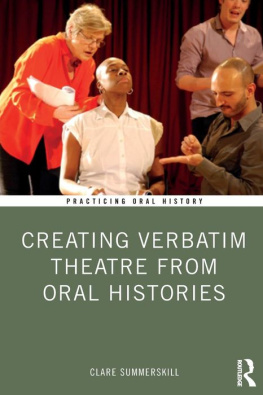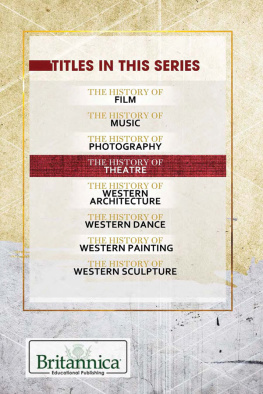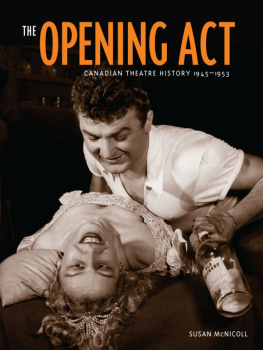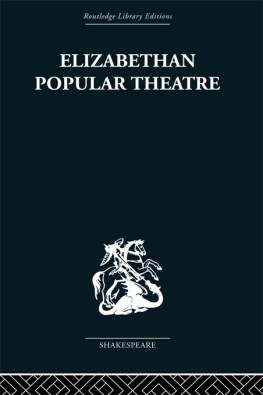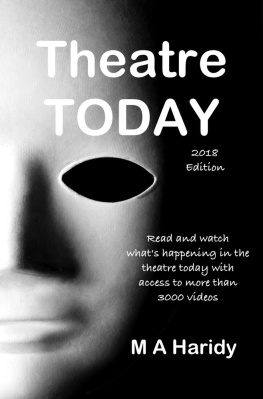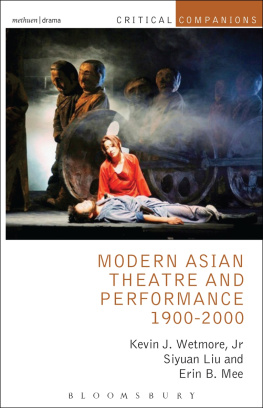CREATING VERBATIM THEATRE FROM ORAL HISTORIES
Offering a roadmap for practicing verbatim theatre (plays created from oral histories), this book outlines theatre processes through the lens of oral history and draws upon oral history scholarship to bring best practices from that discipline to theatre practitioners.
This book opens with an overview of oral history and verbatim theatre, considering the ways in which existing oral history debates can inform verbatim theatre processes and highlights necessary ethical considerations within each field, which are especially prevalent when working with narrators from marginalised communities. It provides a step-by-step guide to creating plays from interviews and contains practical guidance for determining the scope of a theatre project: identifying narrators and conducting interviews, developing a script from excerpts of interview transcripts and outlining a variety of ways to create verbatim theatre productions. By bringing together this explicit discussion of oral history in relationship to theatre based on personal testimonies, the reader gains insight into each field and the close relationship between the two.
Supported by international case studies that cover a wide range of working methods and productions, including The Laramie Project and Parramatta Girls, this is the perfect guide for oral historians producing dramatic representations of the material they have sourced through interviews, and for writers creating professional theatre productions, community projects or student plays.
Clare Summerskill is an independent academic researcher who has recently completed her PhD at Royal Holloway University of London in the Drama department. She is chair and co-founder of the UKs Oral History Society LGBTQ Special Interest Group. She is also a playwright, stand-up and singer-songwriter.
Practicing Oral History
Series editor, Nancy MacKay
Museums, historical societies, libraries, classrooms, cultural centers, refugee organizations, elder care centers, and neighborhood groups are among the organizations that use oral history both to document their own communities and to foster social change. The Practicing Oral History series addresses the needs of these professionals with concise, instructive books about applying oral history best practices within the context of their professional goals.
Titles fall into one of three areas of applied oral history. The first format addresses a specific stage or skill within the oral history process. The second addresses the needs of professional communities who use oral history in their field. The third approach addresses the way oral history can be used to make an impact. Each title provides practical tools, ethical guidelines and best practices for conducting, preserving, and using oral histories within the framework of acknowledged standards and best practices.
Readers across a wide array of disciplines will find the books useful, including education, public history, local history, family history, communication and media, cultural studies, gerontology, documentary studies, museum & heritage studies, and migration studies.
Recent titles in the series
Transcribing Oral History
Teresa Bergen
Practicing Oral History to Improve Outcomes for Refugees and Host Communities
Marella Hoffman
Creating Verbatim Theatre from Oral Histories
Clare Summerskill
For more information, or to place orders visit Routledge, Practicing Oral History, https://www.routledge.com/Practicing-Oral-History/book-series/POHLCP
First published 2021
by Routledge
52 Vanderbilt Avenue, New York, NY 10017
and by Routledge
2 Park Square, Milton Park, Abingdon, Oxon, OX14 4RN
Routledge is an imprint of the Taylor & Francis Group, an informa business
2021 Taylor & Francis
The right of Clare Summerskill to be identified as author of this work has been asserted by her in accordance with sections 77 and 78 of the Copyright, Designs and Patents Act 1988.
All rights reserved. No part of this book may be reprinted or reproduced or utilised in any form or by any electronic, mechanical, or other means, now known or hereafter invented, including photocopying and recording, or in any information storage or retrieval system, without permission in writing from the publishers.
Trademark notice: Product or corporate names may be trademarks or registered trademarks, and are used only for identification and explanation without intent to infringe.
Library of Congress Cataloging-in-Publication Data
A catalog record for this title has been requested
ISBN: 978-0-367-18147-5 (hbk)
ISBN: 978-0-367-18150-5 (pbk)
ISBN: 978-0-429-05977-3 (ebk)
Typeset in Bembo
by codeMantra
I first met Clare on a blustery winter afternoon at the New York Public Library in December 2017. We had exchanged emails about her book idea Clare from London and myself from San Francisco and by lucky chance holiday plans brought us each to New York City. Over a cup of hot chocolate, Clare introduced me to verbatim theatre, a form of documentary theatre that has a strong, but under-recognised, connection to oral history. I immediately saw possibilities for a book on exploring this connection and introducing oral historians and verbatim theatre professionals to each others fields, then providing a roadmap of best practices for using oral history in verbatim theatre. The book would fill a gap in existing literature and open up opportunities for both oral historians and theatre professionals to learn and interact with each other. The result is the book you hold in your hands.
Verbatim theatre, along with tribunal theatre, theatre of testimony, ethnodrama and related forms, is an approach to theatre that falls under the umbrella of documentary theatre. These works are created through the use of pre-existing documentary materials, such as diaries, letters, newspapers and interviews. Clare cautions readers not to take categorisation too seriously; playwrights borrow widely among genres, continually shifting the boundaries to meet their artistic goals and the ethos of the times. See for Clares more thorough description of verbatim theatre. Documentary theatre forms, by nature of their primary source material, tend to favour topics of contemporary interest and often with an eye to bringing awareness to social injustice. Verbatim theatre, in particular, leans toward topics of social or political interest within a particular community, be that a geographical community or a community of interest.
Verbatim theatre scripts are usually created from the exact words excerpted from recorded interviews. The playwright or other members of the team conduct and transcribe the interviews, then the playwright creates characters and a plot thread based on the interviews, and selects excerpts from the transcripts to create scripts that best achieve her artistic goals. Works are performed in theatres and other public performance places to public audiences.
Verbatim theatre and oral history have much in common, particularly through the interviewing stages. Both practices place the narrators testimony at the centre of the project, honouring the integrity of the spoken word at the spoken moment. Both value a community base and often address topics of social injustice. Above all, both honour the uniqueness of the individuals story. After the interview the two practices diverge. Oral historians are concerned with context placing an interview within a framework of time, place and culture, that is, a microcosm in a much bigger story within a chronological timeline. Verbatim theatre artists, however, are mostly interested in creating an artistic work, a theatre piece to be viewed, enjoyed, thought about and discussed, here and now.

